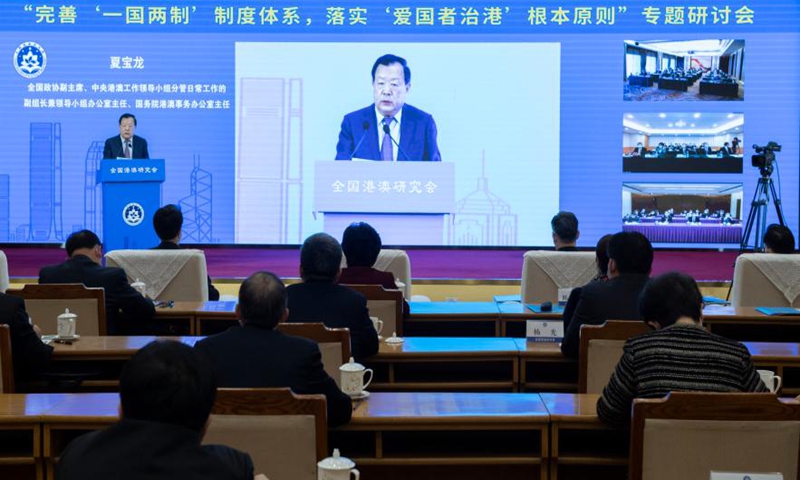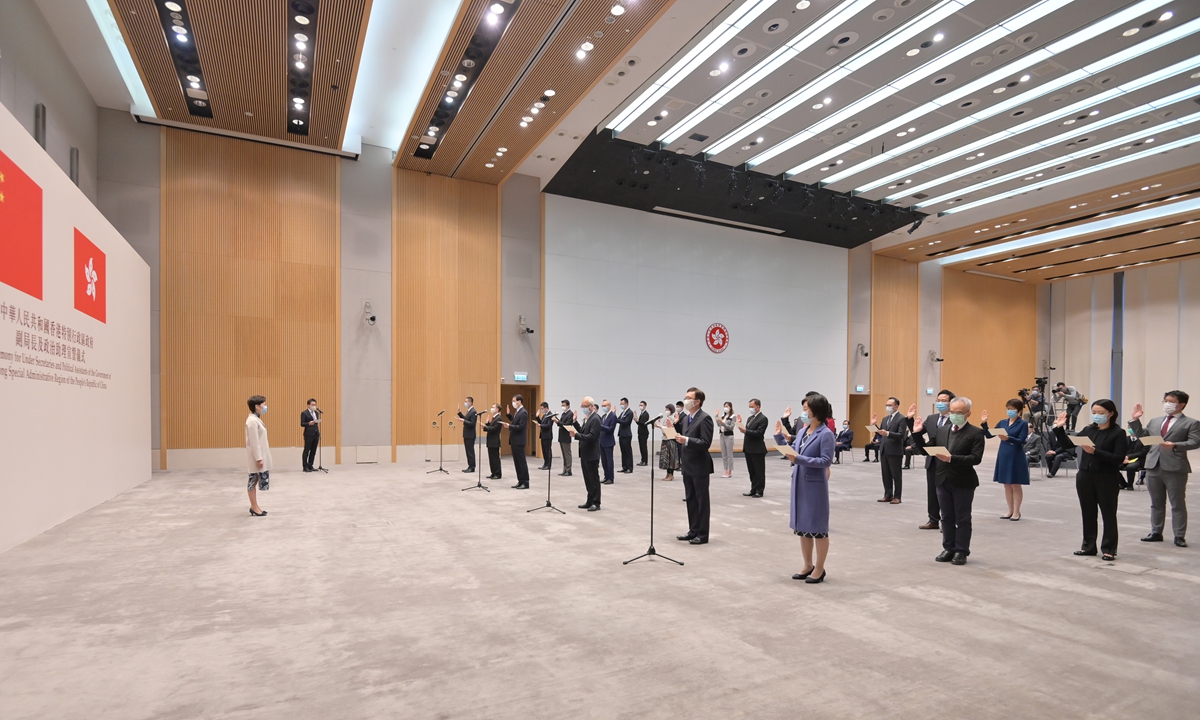
Xia Baolong, vice chairman of the National Committee of the Chinese People's Political Consultative Conference and head of the Hong Kong and Macao Affairs Office of the State Council, makes a speech at the opening of a symposium on improving the institutional framework of "one country, two systems" and implementing the fundamental principle of "patriots governing Hong Kong" in Beijing, capital of China, Feb. 22, 2021. (Xinhua/Gao Jie)
Top Chinese policymakers and political advisors made a clear point on Monday that conducting political and electoral reforms in Hong Kong to fix loopholes and ensure the principle of "patriots governing Hong Kong" has become an urgent task, which is likely to be clarified at the upcoming two sessions next week.
To ensure this principle, a series of fundamental standards have also been laid out, outlining the pathway of the reforms in tackling the loopholes caused by the lack of full-scale implementation of the principle.
In a speech delivered at a Monday online panel held by the Chinese Association of Hong Kong and Macao Studies, in which experts and officials from Beijing, Hong Kong and Macao gathered, Xia Baolong, director of the Hong Kong and Macao Affairs Office of the State Council, said the power of administration of Hong Kong should always be held by patriots, referring to remarks made by Chinese President Xi Jinping when Carrie Lam, chief executive of the Hong Kong Special Administrative Region (HKSAR) government, delivered her annual work report on January 27 via video link.An over 5,400-word speech from the top central government official on Hong Kong affairs was considered highly informative, which elaborated upon the historical background of the principle concerning patriots governing Hong Kong, and its relations with the "one country, two systems"—the baseline policy for the HKSAR, a set of basic standards determining who true patriots are and what rules to follow in the imminent electoral reforms for the city.
Some Chinese political advisors who attended the panel discussion called it a "landmark constitutional moment," consisting of a systematic upgrade to the "one country, two systems."
Carrying out electoral reform must respect the central government's overall jurisdiction on the matter, and some advisors contacted by the Global Times said the procedures of implementing the reforms will be akin to the implementation of the national security law for Hong Kong, led by the central government, to effectively fix loopholes to ensure Hong Kong elections in the second half of 2021 proceed smoothly and orderly in a safe environment.
Pressing issue Xia set out some fundamentals for carrying out relevant reforms to meet the principle, including improving the electoral system under the Constitution and the Basic Law, respecting the central government's overall jurisdiction and conforming to the current situation in Hong Kong by avoiding simply copying foreign electoral systems.
"In other words, the central government will be the first entity to assume responsibility for reforms in Hong Kong, which can take the initiative of rectifying and adjusting the system as the electoral system is within the scope of authority of the central government," Tian Feilong, an associate professor at Beihang University's law faculty and a member of the Chinese Association of Hong Kong and Macao Studies who attended the forum, told the Global Times on Monday.
Unlike the previous procedures of implementing political reforms in Hong Kong in 2005, 2010 and 2015, which were proposed by the HKSAR government and then approved by the central government, the upcoming reforms would be brought up by China's top legislative body the National People's Congress (NPC) and its standing committee, which authorizes rectification of relevant articles and procedures through Annex I and II of the Basic Law, Tian said, referring to shared thoughts from Wang Zhenmin, former legal affairs director of the liaison office, at the forum.
It's highly likely that the detailed plan of rectifying the electoral system in Hong Kong would be brought up at the upcoming national two sessions in Beijing, Chan Yung, an NPC deputy who is a vice chairman of the pro-establishment group Democratic Alliance for the Betterment and Progress of Hong Kong (formerly known as Democratic Alliance for Betterment of Hong Kong), told the Global Times on Monday.
This year's two sessions - the Fourth Plenary Session of the 13th NPC and the Chinese People's Political Consultative Conference (CPPCC) will convene on March 5 and March 4 respectively in Beijing.
Although Tam Yiu-chung, a member of the Standing Committee of the NPC, did not confirm the schedule for discussing the details of the reform in a meeting session of the committee this week. However, Tam did tell the Global Times that now is the time for collecting mass public opinion on the subject.
Clear definition & standards Hong Kong experienced severe political turmoil in 2019 when anti-government rioters used scorched earth strategies to paralyze the city in pursuit of their political goals. Some secessionists and extreme anti-government forces spread secessionist ideas, opposing the authority of the central government, instigating dissatisfaction toward the mainland and recklessly interfering in the governance process of the HKSAR government, forcing society as a whole to pay a heavy price for it.
Xia attributed the earlier chaos in the city to the lack of full-scale implementation of the "patriots governing Hong Kong" principle, which has also become a major urgent task, for which the Chinese official also laid out a series of basic standards including the idea that patriots truly safeguard their country's sovereignty, security and development interests.
Also, there have been certain specific descriptions laid out for those "who are and who are not patriots," for example, those who attack the central government in a hysterical manner, openly advocate for "Hong Kong independence" and beg for foreign sanctions against the city certainly are not patriots.
Patriots love the country, more specifically, the People's Republic of China, and respect and safeguard the country's fundamental system and the constitutional order of the HKSAR. "The CPC led the people to establish the People's Republic of China, and in a country that practices socialism, there can be different political views, but there is a red line, that is we will never tolerate any acts that hurt the fundamental system of the country, namely, the socialism led by the CPC," Xia said.

Hong Kong government holds an oath-taking ceremony for undersecretaries and political assistants. Witnessed by Chief Executive Carrie Lam, the 12 undersecretaries and 14 political assistants vowed to uphold the Basic Law of the Hong Kong Special Administrative Region (HKSAR) and swore allegiance to the HKSAR. Photo: AFP
The definition of "patriots in Hong Kong" has been upgraded compared to three standards laid out by former leader Deng Xiaoping, particularly, in areas such as not challenging the power of the central government, loving the country is loving the PRC and never hurting the CPC-led socialism system, Lau Siu-kai, vice-president of the association, told the Global Times on Monday.
"Xia's speech also delivered an important message that patriots must recognize the leadership of the CPC in China, and accept it," Lau said, noting that it also means those who shoulder administrative responsibilities in Hong Kong must implement the CPC-designed "one country, two systems" policy even if they don't believe in communism.
Reform scopesXia also outlined five principles for conducting the electoral reforms including strictly following the Constitution and the Basic Law by fully respecting democratic rights while effectively safeguarding sovereignty, security and development interests. Hong Kong officials must ensure elections are justified, fair and open but also effectively impede anti-government rioters and foreign anti-China forces from cultivating their political agents in the administrative organs of Hong Kong.
Citing an unnamed source, local newspaper in Hong Kong the Ming Pao said the reforms would be focused on the seats of district councilors and the five major electoral districts would be subdivided into more districts in order to make sure the anti-government lawmakers don't win the majority of the seats.
Xia's remarks indicate a comprehensive reform of Hong Kong's electoral system, including means of election, campaigns and funding, candidate qualification review, oath before taking office, examination on the performance of duty, as well as external supervision. It also means a widened scope of reform from the elections of the chief executive and the Legislative Council, to that of district councils and even judicial organs, Lau noted.
"A key focus would be the qualification of candidates. As the electoral officer is only a middle-level officer in the civil service structure, who can't conduct full-scale political scrutiny over the candidates in order to bar those who are against China and stir trouble, so it's necessary for the government to set up a mechanism or a department to do so," Lau said previously. Carrie Lam, chief executive of the HKSAR government, told a press conference on Monday that the HKSAR government will fully respect the jurisdiction power of the central government on the matter and will fully cooperate. In the next 12 months, Hong Kong will have the Legislative Council election, Election Committee election and election for the new chief executive, given the urgency of fixing the electoral system problem, Lam said that she believed the central government will consider a relevant timetable for carrying out the reforms.
"Those who govern Hong Kong don't simply include the chief executive but also major officials, LegCo lawmakers, judges, district councilors and civil servants, who all need to safeguard national interests and love the country," she said.





